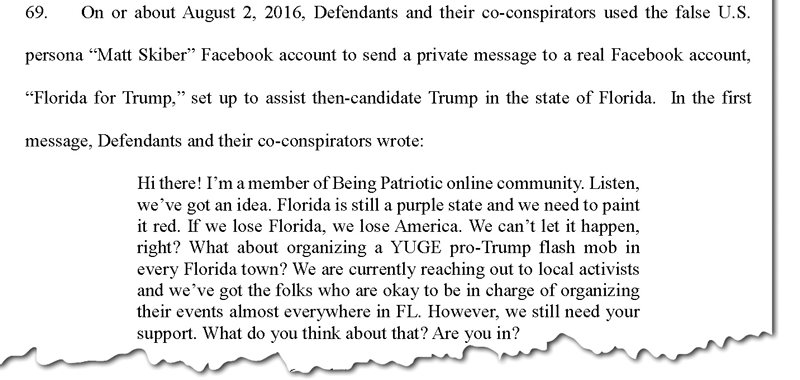On Friday February 16th, 2018 the United States Justice Department indicted three organizations and thirteen Russian individuals for Conspiracy to Defraud the United States and Conspiracy to Commit Wire Fraud and Bank Fraud related to actions before and after the 2016 Presidential Election designed to manipulate American politics. Today’s posting includes the indictment as well as a selection of documents from the Cyber Vault pertaining to Russian use of cyberspace as a tool of political influence.
New to the Cyber Vault

This document indicts Zoobia Shahnaz for defrauding financial institutions of $85,000 and converting that money into cryptocurrency before transferring it to support the Islamic State.

This document charges three organizations and thirteen Russian individuals with Conspiracy to Defraud the United States and Conspiracy to Commit Wire Fraud and Bank Fraud related to actions before and after the 2016 Presidential Election designed to manipulate American politics.
From the Cyber Vault
This letter from Rep. Tom Carper, written in response to reports of possible Russian cyberattacks on state elections systems, provides information to two officials of the National Governors Association on cyber security resources available from the Department of Homeland Security.
This executive order announced publicly acknowledged measures taken by the Obama administration in response to Russia's alleged involvement in the hacking of Democratic National Committee and other computer systems. The annex identifies the entities targeted by the measures - including the Russian security service (FSB) and military intelligence (GRU).
The Intelligence Community Assessment concerning Russian activities and intentions in recent U.S. elections is an unclassified version of a joint CIA-FBI-NSA assessment. It begins with the observation that "we assess with high confidence that Russian President Vladimir Putin ordered an influence campaign in 2016 aimed at the US presidential election," and includes conclusions about the nature of the campaign, the extent of the effort compared to previous efforts, and the existence of a "new normal" in Russian influence efforts. An annex consists of a December 2012 report on Russian televisions attempt to influence U.S. politics.
This report is a greatly expanded version of the GRIZZLY STEPPE analysis released in late December 2016, and focuses on the use of the Cyber Kill Chain model (whose components are reconnaissance, weaponization, delivery, exploitation, installation, command and control, and actions on the objective) to analyze malicious cyber activity.
This two-page briefing on foreign cyber activity and the 2016 U.S. elections makes five points, which concern reports or assertions concerning the "hacking" of the presidential election, Russian intrusions into state and local election boards, attempted intrusions into state and local boards, Department of Homeland Security assistance to the states, and current safeguards and plans to improve those safeguards.
This top secret codeword report provides details on a GRU (Russian military intelligence) cyberattack on a U.S. voting software supplier and spear-phishing campaign targeting more than 100 local election officials (conducted days before last November's presidential election).
Sen. Mark R. Warner to John F. Kelly, Secretary of Homeland Security, June 20, 2017. Unclassified.
In this letter to the secretary of homeland security, Warner, vice chairman of the Senate Select Committee on Intelligence, notes his concern about the danger of future foreign interference in U.S. elections and urges the secretary to work closely with state and local election officials "to disclose publicly which states were targeted, to ensure that they were fully aware of the threat, and to make certain that their cyber defenses are able to neutralize this danger."
In his testimony before the Senate Select Committee on Intelligence, Sarts presents case-study research conducted at the NATO Strategic Communications Centre of Excellence on the tools used by Russia in conducting influence operations and Western responses before making a series of policy recommendations.
This testimony was presented at a hearing to examine the use of the internet and social media by Russian Intelligence Agencies and extremist groups as well as strategies to counter threatening activity.
This testimony concerns Russia's use of social media to influence American political discourse.

